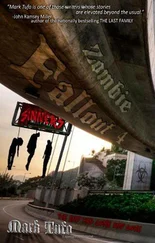TOM WAS BEING HELD TEMPORARILY in a central holding cell near the city courthouse. At his initial hearing, his bail was set at twenty thousand dollars, which some of us thought was a little much, and others considered much too little. In the end it didn’t matter because no one would post it for him, and he didn’t want to part with any of the little money he had saved from the sale of his Naperville house. Or so he told Joe Pope, who went to visit him. Tom labored under idiosyncratic and stubborn notions, but even he must have known that the court costs, lawyers’ fees, and criminal fines that he’d have to pay for pulling his little stunt were going to tap him dry forever. We had no doubt that his inclination to stick around the jail cell was influenced by the fact that he had been processed on a Friday, and that by posting bail, he’d have nothing but another aimless weekend to muddle his way through, getting drunk and harassing the groundskeepers of his apartment complex, and composing e-mails to people who never wrote him back. So he decided to stick around and have a few hot meals on the state until his arraignment, when he would be charged with five counts of aggravated assault and battery, destruction of private property, and trespassing.
When we heard Joe Pope went to visit him, we were beside ourselves with disbelief. We were surprised, confused, angry, curious, tickled, and dumbfounded. It took everything in us not to dismiss the rumor as an absurd invention. But no, it was true, Joe himself admitted it before commencing a meeting in the Michigan Room. We were there to discuss details of the caffeinated bottled water, and everyone was fearful of a long night. Comparing conflicting accounts and trying to win the new business at the same time was taking it out of us. It would only prolong things to talk about anything but the work, but we couldn’t help ourselves, and someone asked Joe as he walked in if it was really true. Had he become Tom Mota’s prison wife?
Joe smiled. He set down his leather day planner and pulled out a seat at the head of the conference room table.
“No, seriously,” said Benny. “Did you go visit him?”
“I did.”
“How come?”
Joe sat down and scooted in. “I was curious,” he said.
“Curious about what?”
Joe looked around the room. We were quiet. “Do you remember what he said to me?” he asked us. “He was standing in the hallway, holding the gun, which I thought was real at the time. And he says, remember what he said? He said, ‘Joe, I came to take you to lunch.’”
Some of us recalled hearing Tom say that and some of us were hearing it for the first time. What we remembered most clearly was Tom unfurling some lunatic gibberish as he wheeled and aimed and pulled the trigger — crazy talk that announced we were in the hands of a madman.
“No, after all that,” said Joe. “The last thing he said before Andy tackled him.”
“I don’t remember him saying he wanted to take you to lunch,” said Larry Novotny.
“Maybe because at the time, Larry,” said Karen Woo, “you were cowering with Amber in the server closet.”
According to Joe, Tom said it so calmly and matter-of-factly that it was almost as shocking as finding him there at all. Or rather, it was the juxtaposition between what he said — “I’ve come to take you to lunch” — and what he was doing — dressed as a clown and holding a gun — that was so odd. What did it mean? he wondered. Was it a euphemism? Did Tom actually intend to kill him and that was his clever way of saying it? If so, why did he point the gun at the ground just as he said it? Joe did not yet know it was a paintball gun. When he found that out, it seemed Tom might have legitimately wanted to take him to lunch.
“Where do you think he wanted to take you?” asked Jim Jackers.
“The Sherwin-Williams café,” quipped Benny.
“Jim,” said Karen, shaking her head across the table at him, “where he wanted to take him is not the point.”
“After he was arrested,” Joe continued, “Carl came to my office and showed me an e-mail Tom had sent him. It said that Tom was stopping by the office that day because he wanted to talk to me. I went to see him because I was curious. What did he want to talk about?”
“And what was it?” asked Benny.
“Ralph Waldo Emerson,” said Joe.
“Ralph Waldo Emerson?”
“Is he the guy with the pond?” asked Jim.
“You’re thinking of Henry David Thoreau,” said Hank.
“Jim is thinking of the Budweiser frogs,” said Karen.
We recalled the book Tom had purchased for Carl Garbedian, and what he had said to Benny on the day he was terminated. Tom Mota, ladies and gentlemen — martini addict, gonzo e-mailer, sometime wielder of an aluminum bat, great garden enthusiast, paintball terrorist, and our own in-house Emerson scholar. He had the annoying tic during his time with us of pinning aphorisms to the wall. We liked nothing less than people quoting at us from their corkboards. Hank Neary was the only one who could quote at us with impunity because he rarely made any sense, so we knew the quotation must add up somehow and we marveled at the obscurity. Quotations that tried to instruct us or rehabilitate our ways, like those Tom favored — we didn’t like those quotations. We were especially put off by Tom’s because it seemed a great irony that Tom Mota was trying to reveal to us a better way to live, when just look at the guy! What a fuckup. His quotations were never allowed to stay pinned up for very long. It would take him days to notice and then he would holler out into the hall, in his inimitable and eloquent manner, “Who the fuck’s been stealing my quotes?”
He and Joe were sequestered in a small, windowless room. We expected something different: a booth, some bulletproof glass, a pair of red phones. But according to Joe it was a room no bigger than the average office on sixty. It was almost possible to imagine their unlikely conversation unfolding where conversations always unfolded for us, only this time, the door locked from the inside, and Tom wasn’t allowed any thumbtacks with which to pin up his ludicrous and heartfelt quotations. Joe was sitting at the table when Tom was escorted in by two guards. He was wearing a tan jumpsuit with D.O.C. stenciled on the back, and he was shackled with handcuffs. The guards told them they had fifteen minutes.
“Being treated okay, Tom?”
“How are those fucks?” asked Tom. “Recovering?”
Joe gave Tom the general rundown of events after he was arrested. Tom said he was happy we got Friday afternoon off. They talked about Tom’s situation, what his lawyers were saying they could do for him if he pled guilty and acted penitent. Then Joe asked him what he had come there to ask him.
“I just said, ‘What did you want to talk to me about that day, Tom?’” Joe said to us. “And finally he admitted that he was the one who had Sharpied FAG on my wall.”
“No shit,” said Benny.
“I thought you did that to yourself,” said Jim Jackers.
“No,” said Joe.
“Jim, think about it,” said Karen. “Why would Joe do that to his own office? God.”
“I can’t tell you how many times I asked him, Joe,” said Benny. “I said, ‘Tom, come on, man, tell me the truth. Did you do that to Joe’s wall?’ Every time he denied it.”
Tom tried to explain himself. “I refused to conform,” he said to Joe. “When somebody said something stupid, everybody smiled and simpered and shook their heads. But me, I told them it was stupid. Everyone listened to the same goddamn radio station. Fuck that. I stayed late and went by everybody’s desk and spun the dial. I wore three polos on top of each other for a month, Joe, because I wasn’t being fooled and I wanted people to know it. I learned all that from reading Emerson. To conform is to lose your soul. So I dissented every chance I got and I told them fuck you and eventually they fired me for it, but I thought, Ralph Waldo Emerson would be proud of Tom Mota.”
Читать дальше












